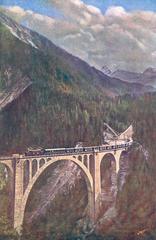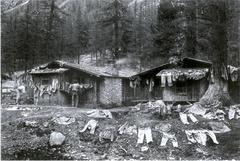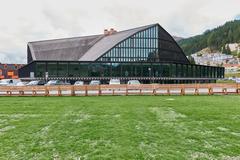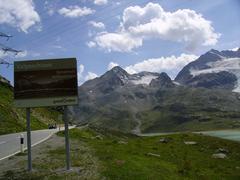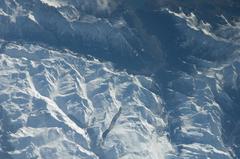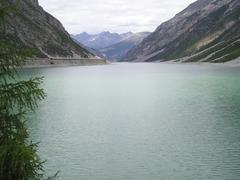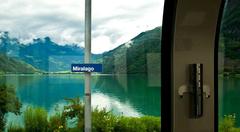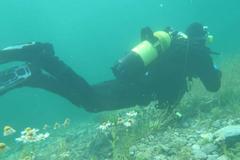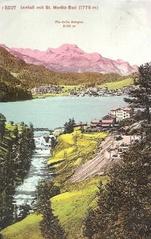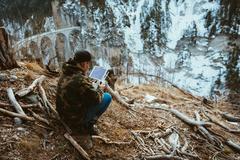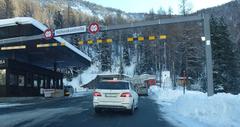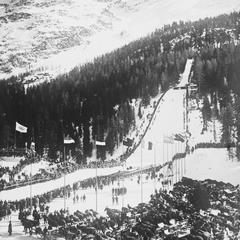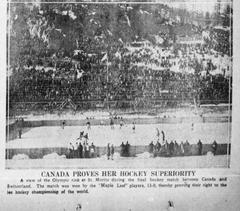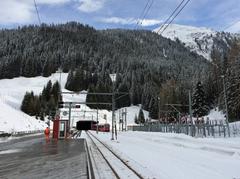
Wiesen Viaduct Visiting Hours, Tickets, and Travel Guide in Canton of the Grisons, Switzerland
Date: 14/06/2025
Introduction: The Wiesen Viaduct and Its Significance
The Wiesen Viaduct stands as a majestic testament to Swiss railway engineering, nestled amid the dramatic alpine scenery of the Canton of the Grisons (Graubünden). Completed in 1909 as a key link on the Davos–Filisur railway, this stone arch bridge—measuring 210 meters in length and soaring nearly 89 meters above the Landwasser gorge—remains one of the world’s tallest and longest masonry viaducts. Renowned for its harmonious integration into its rugged surroundings and its robust concrete and stone construction, the viaduct is a functional landmark still in daily use by the Rhaetian Railway and a symbol of regional pride and identity. Today, the Wiesen Viaduct attracts travelers, photographers, and railway enthusiasts from around the globe, who come to experience its scenic train journeys, panoramic hiking trails, and cultural heritage (Wikipedia: Wiesen Viaduct; Graubünden Tourism; RouteYou: Wiesen Viaduct).
Contents
- Historical Background and Engineering Significance
- Visitor Information: Hours, Tickets, and Accessibility
- Cultural and Artistic Impact
- Nearby Attractions and Activities
- Frequently Asked Questions (FAQ)
- Practical Visitor Information
- Responsible Tourism
- Conclusion & Call to Action
- Sources and Further Reading
Historical Background and Engineering Significance
Origins and Construction
Conceived as a vital component of the Davos–Filisur railway, the Wiesen Viaduct was built to bridge the Landwasser gorge and connect remote alpine communities. Construction began in 1906, overseen by chief engineer Henning Friedrich and site managers Hans Studer and P. Salaz. The project required innovative techniques, including extensive wooden falsework designed by carpenter Richard Coray, to support the massive masonry arches during assembly. The viaduct opened for traffic in July 1909, reflecting the technical ambition and economic significance of Swiss railway expansion in the early 20th century (Wiki2: Wiesen Viaduct).
Architectural Features
The viaduct’s design combines concrete blocks with stone facings, blending durability with visual harmony in the alpine setting (Tripomatic: Wiesen Viaduct). Key features include:
- Length: 210 meters
- Height: 88.9 meters
- Main Span: 55 meters (one of the world’s longest for a masonry bridge)
- Arches: Seven in total—one prominent main arch flanked by smaller ones
The structure’s slender profile and graceful arches exemplify Swiss engineering expertise and a sensitivity to environmental integration (RouteYou: Wiesen Viaduct).
Integration with the Davos–Filisur Railway
Located 300 meters from Wiesen railway station, the viaduct is the most imposing structure along the Davos–Filisur route, renowned for its tunnels, bridges, and technical complexity. Electrified in 1919, the line remains an active passenger and occasional freight corridor serving both locals and tourists (Wikipedia: Davos Platz–Filisur railway).
Visitor Information: Hours, Tickets, and Accessibility
Visiting Hours
- Viaduct and Trails: Open 24/7, year-round. The best season is from May to October, when trails are clear and the weather is favorable.
- Sky Walk (Pedestrian Bridge): Typically open late May to September; check local tourism resources for current accessibility.
Ticket Information
- Viaduct and Hiking Trails: Free access; no admission fees or tickets required.
- Train Crossings: Tickets required for Rhaetian Railway trains crossing the viaduct. Tickets can be purchased at stations or online.
Getting There
- By Train: Take the Rhaetian Railway to Wiesen Station (Bahnhof Wiesen), served by regular Regio trains from Davos Platz and Filisur. The station is a short walk from the viaduct (Bergün Filisur Tourism).
- By Car: Parking is available near Wiesen Station, with marked trails leading to viewing platforms.
Accessibility
- Trails: Most main trails are accessible to able-bodied visitors; some are steep or uneven.
- Wheelchair/Pram Access: The route from Filisur to Schönboden is pram- and wheelchair-friendly, but the last stretch to the viaduct may require assistance.
- Facilities: Viewing platforms, picnic spots, and rest areas are available. Toilets are located at Wiesen Station.
Guided Tours
Occasional guided tours, particularly in summer, offer historical and technical insights. Check with local tourism offices for current offerings (Bergün Filisur Tourism; Davos Tourism).
Cultural and Artistic Impact
The Wiesen Viaduct has inspired numerous artists and has become a symbol of Swiss railway heritage:
- Art: German expressionist Ernst Ludwig Kirchner depicted the viaduct in his 1926 painting “The Bridge near Wiesen,” emphasizing its dramatic integration into the alpine landscape (Wikipedia: The Bridge near Wiesen).
- Tourism & Media: The viaduct is a frequent subject in travel posters, railway advertising, and social media, drawing photographers and enthusiasts worldwide (RouteYou: Wiesen Viaduct).
Nearby Attractions and Activities
Villages
- Wiesen: A tranquil village known for traditional architecture and historic St. Martin’s Church (Swiss Glorious).
- Filisur: Gateway to the Albula Railway and the Landwasser Viaduct, featuring the Albula Railway Museum in nearby Bergün.
Engineering Marvels
- Landwasser Viaduct: A UNESCO World Heritage site, one of Switzerland’s most photographed bridges (My Switzerland).
- Cavja & Schmittner Viaducts: Reachable via local hiking trails.
Activities
- Hiking: Family-friendly and advanced trails, including the 4-Viaduct Hike, offer panoramic views and informative panels (Claudia Travels).
- Scenic Train Rides: The Glacier Express and regular Rhaetian Railway services cross the viaduct; summer brings nostalgic rides with vintage locomotives (Bridge Info).
- Wildlife & Nature: The surrounding valley offers opportunities for wildlife observation, mountain biking, and winter sports.
Frequently Asked Questions (FAQ)
Q: Are there entrance fees to visit the Wiesen Viaduct?
A: No, access to the viaduct and trails is free. Train journeys require a valid ticket.
Q: What are the visiting hours?
A: The area is accessible year-round, 24/7. The best visiting months are May–October.
Q: Is the site accessible for people with limited mobility?
A: Selected trails are pram- and wheelchair-friendly; the final approach to the viaduct may be challenging. Facilities in nearby villages offer more accessibility.
Q: Are guided tours available?
A: Yes, especially in summer. Check with local tourism offices for schedules.
Q: How do I get there by public transport?
A: Take the Rhaetian Railway to Wiesen Station. The viaduct is a 5-minute walk from the station.
Practical Visitor Information
- Location: Near Wiesen Station, Canton of the Grisons, Switzerland
- Coordinates: Approx. 46.687° N, 9.728° E
- Facilities: Exhibition at Wiesen Station, bistro, toilets, picnic/rest areas
- Contact:
Bergün Filisur Tourismus AG
Veja Stazion 1, 7482 Bergün/Bravuogn, Switzerland
+41 (0)81 407 11 52
[email protected]
(Bergün Filisur Tourism)
Responsible Tourism
- Use public transport to minimize environmental impact.
- Stay on marked trails and respect wildlife.
- Take litter with you and use provided facilities.
- Respect local customs and languages—Graubünden is multilingual.
Conclusion & Call to Action
The Wiesen Viaduct offers a spectacular combination of historic engineering, natural beauty, and Swiss cultural heritage. With free, year-round access, well-maintained hiking trails, and nearby attractions, it is a must-visit for anyone exploring the Grisons region. For the best experience, time your visit with a train crossing, explore the adjacent villages and museums, and enjoy the breathtaking landscapes.
Plan your trip today:
- Download the Audiala app for offline maps, detailed guides, and the latest updates.
- Purchase train tickets online or at stations for scenic journeys across the viaduct.
- Check local tourism sites for event schedules and guided tour availability.
Sources and Further Reading
- Wikipedia: Wiesen Viaduct
- Wikipedia: The Bridge near Wiesen
- Bergün Filisur Tourism
- RouteYou: Wiesen Viaduct
- Graubünden Tourism
- Davos Tourism
- Rhaetian Railway Official Site
- Swiss Glorious
- My Switzerland
- Claudia Travels
- Bridge Info

